

Aspirational parents condemn their children to a desperate, joyless life. The best argument against Australian inequality. Inequality has reached the point where even billionaires are worried about it.

In an open letter to “my fellow zillionaires”, American dot-com entrepreneur Nick Hanauer warns that rising inequality is making his country “less a capitalist society and more a feudal society”. Hong Kong billionaire Li Ka-shing, the 15th richest person in the world, says that his concerns about widening polarisation are keeping him awake at night: “… why am I sleepless in Hong Kong? I fear that widening inequality in wealth and opportunities, if left unaddressed could fast become ‘the new normal’.” In a world where worsening inequality is widespread, Australia is still managing to pull away from the pack. Compared to the average for OECD countries, income inequality is growing significantly faster in Australia. In comparison with other prosperous countries, Australia has generally had much more targeted redistributive programs. Over time, income disparities lead to wealth disparities. Joseph Stiglitz: ‘GDP per capita in the UK is lower than it was before the crisis. That is not a success’
Think back to 2008.
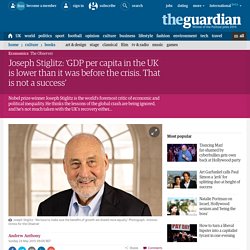
There was an inquest into Princess Diana’s death, Portsmouth won the FA Cup and Jonathan Ross and Russell Brand got in trouble for making a prank call to Andrew Sachs. Oh yeah, and the global economy almost collapsed. To prevent the disintegration of international banking, and capitalism as we know it, governments were forced to pour trillions of dollars into rescue packages. In Britain alone, government loans to and investment in the banks amounted to hundreds of billions of pounds, which in turn presaged a debt crisis and years of austerity measures.
The world was in a dire mess and investment bankers, with their incomprehensible derivatives and collateralised debt obligations, were widely seen as the venal culprits. Yet seven years on, the banks are once again returning massive profits and bonuses, the stock exchange is buoyant, consumer spending is driving growth, and the housing market is soaring ever upwards. The strikes sweeping Germany are here to stay. German strikes once seemed like German jokes: a contradiction in terms.
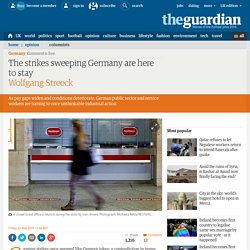
But no more: this year, Europe’s largest economy is on course to set a new record for industrial action, with everyone from train drivers, kindergarten and nursery teachers and post office workers staging walkouts recently. Research Highlights. Generous welfare systems actually make people more keen to work, Europe-wide study finds - Europe. The research released by the British Sociological Association comes as all major parties indicate they want to reduce spending on benefits.
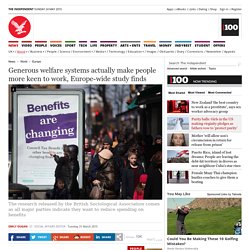
Survey responses from 19,000 people in 18 European countries, including the UK, indicated that the sums spent on welfare had a positive impact on people’s desire to find work. Sociologists Dr Kjetil van der Wel and Dr Knut Halvorsen examined responses to the statement “I would enjoy having a paid job even if I did not need the money” and compared responses with the amount the country spent on welfare benefits and employment schemes.
The results were adjusted according to population differences between states. Knowledge Isn’t Power. Regular readers know that I sometimes mock “very serious people” — politicians and pundits who solemnly repeat conventional wisdom that sounds tough-minded and realistic.
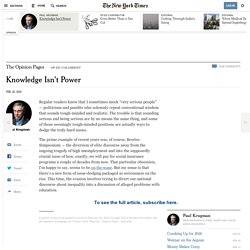
The trouble is that sounding serious and being serious are by no means the same thing, and some of those seemingly tough-minded positions are actually ways to dodge the truly hard issues. The prime example of recent years was, of course, Bowles-Simpsonism — the diversion of elite discourse away from the ongoing tragedy of high unemployment and into the supposedly crucial issue of how, exactly, we will pay for social insurance programs a couple of decades from now. That particular obsession, I’m happy to say, seems to be on the wane. But my sense is that there’s a new form of issue-dodging packaged as seriousness on the rise. This time, the evasion involves trying to divert our national discourse about inequality into a discussion of alleged problems with education.
The terrible loneliness of growing up poor in Robert Putnam’s America. Political scientist Bob Putnam is photographed at the Harvard Kennedy School of Government.
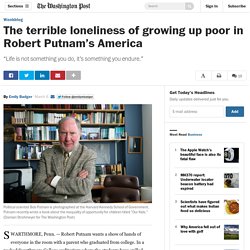
Putnam recently wrote a book about the inequality of opportunity for children titled "Our Kids. " Russell Brand: what monkeys and the Queen taught me about inequality. When travelling in impoverished regions in galling luxury, as I have done, you have to undergo some high-wire ethical arithmetic to legitimise your position.
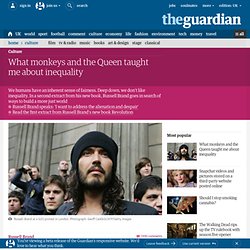
Neoliberalism has brought out the worst in us. We tend to perceive our identities as stable and largely separate from outside forces.
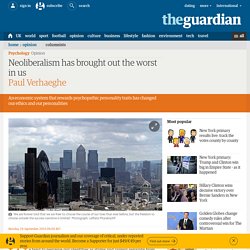
But over decades of research and therapeutic practice, I have become convinced that economic change is having a profound effect not only on our values but also on our personalities. Thirty years of neoliberalism, free-market forces and privatisation have taken their toll, as relentless pressure to achieve has become normative. If you’re reading this sceptically, I put this simple statement to you: meritocratic neoliberalism favours certain personality traits and penalises others. There are certain ideal characteristics needed to make a career today. How the super rich got richer: 10 shocking facts about inequality. 1.
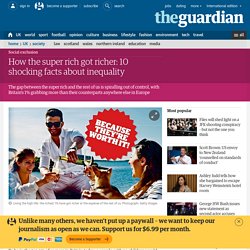
The top 1% no longer includes most doctors and head teachers.